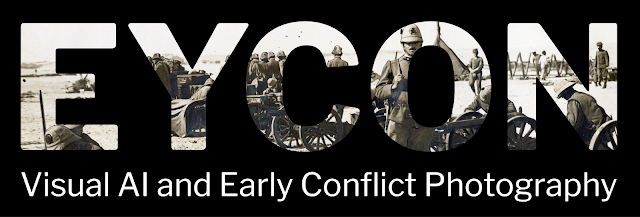I am thrilled to be the Principal Investigator (UK) for the Early Conflict Photography 1890-1918 and Visual AI (EyCon) project. EyCon aims at harnessing Artificial Intelligence (AI) reliant tools to analyse a large corpus of photographs, and the project’s database will include thousands of historical photographs documenting armed violence. EyCon is co-funded by AHRC/Labex Passés dans le Présent joint grant (more about the programme here) and a Université de Paris Idex “chaire environnée”.
Recent digitisation efforts of historical photographs by archival institutions have often been done in silo. This is an issue for researchers and archivists, but it also raises the question of public uses of history when it comes to contemporary perspectives on colonial/imperial warfare. Disconnected visual repositories reinforce deeply entrenched notions of national exceptionalism in France, Britain and in other states with a history of international interventionism and expansionism. Drawing on advanced technologies such as AI, EyCon aims at connecting, analysing and commenting on these divided repositories to increase the discoverability and usability of overlooked and scattered material on colonial, imperial and international armed conflicts up to 1918.
I will be working with Dr Julien Schuh, Prof. Daniel Foliard, and other colleagues (including a UK postdoc). The project is partnering with a wide network of archival institutions in France and in the UK, and will bring together Humanities scholars, technical experts, archivists and other stakeholders to produce innovative research at the juncture of computer science, archival studies and history. It will also make digitised records more accessible to a wide range of users.
EyCon’s primary objective is to assess the usefulness of computation to visualise, navigate and analyse large visual corpora. The project aims at harnessing and questioning computation as well as testing new approaches to visualisation when it is applied to historical investigation. In doing so, it addresses the ethical and epistemological issues raised by the application of AI tools to controversial pasts.
EyCon has two specific objectives:
1. The aggregation of data into a thematic collection on early conflict photography. A wide array of photographic material from disconnected repositories will be aggregated into a thematic collection on early conflict photography (1890-1918) with a focus on non-European theatres of war. Image extraction scripts will be used to enrich the database with photo-engravings from digitised published material. The collection will be interoperable and consistent with the IIIF framework.
2. The development of AI techniques for historical enquiry and data enrichment of a large visual corpus of historical photographs. EyCon aims at providing researchers and other users with integrated computational tools to apply distant vision to its visual database and solutions to augment their close reading capacities. The project team will use AI-reliant tools:
• To compare and search images for similarities
• To visualise of a large visual corpus thanks to image embeddings, topic modeling and clustering
• To isolate photographic tropes, subgenres as well as significant “anomalies” in the database
• To retrain existing datasets on early conflict photographs.
